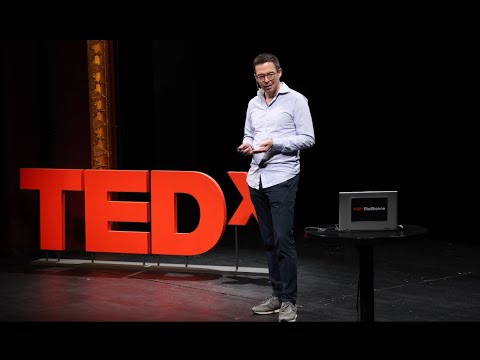*****
Summary of Transcript:
The speaker talks about the concept of longevity, which means living longer in good health, and how it will change the way we lead our lives and how society will evolve. He explains that if you reach the year 2045 in good health, you no longer have to die, due to the concept of “longevity escape velocity”. The speaker is an entrepreneur who has identified innovation early in the past, investing against climate change in 2009 and in blockchain and cryptocurrencies in 2016, and now in longevity since 2020. He explains that scientists have identified the nine hallmarks of aging, which are the reasons why people age, and scientists are finding solutions to slow down aging and even stop it in some areas. The speaker sees longevity as an opportunity for new products and services and describes it as the biggest market we have seen. The speaker believes that people want to extend their health span rather than their lifespan and that people are willing to give away some of their wealth for additional years of healthy life. The speaker sees longevity as a positive development, and something that will benefit society, including Switzerland.
*****
Summary of Description:
Tobias Reichmuth’s TEDxBielBienne talk discusses the challenges and opportunities presented by our increasing lifespan. He explores the latest scientific and technological advancements in anti-aging research and how they could transform our lives. Reichmuth encourages us to embrace the potential of a longer lifespan and consider its implications for our personal and societal well-being. Reichmuth is a Swiss entrepreneur and investor known for his participation in the TV show “Die Höhle der Löwen” Switzerland. The talk was independently organized by a local community.
*****
Exploring the Concept of Longevity: Opportunities and Challenges for Society
In his TEDxBielBienne talk, Tobias Reichmuth delves into the concept of longevity and dissects its impact on society. He provides valuable insights into the latest scientific and technological developments in anti-aging research and how they could potentially transform our lives. Reichmuth’s talk encourages us to embrace the possibilities of a longer lifespan while considering its implications for our personal and societal well-being.
The Opportunity and Challenge of Increasing Life Expectancy
Reichmuth begins his talk by highlighting the significant increase in human life expectancy over the years. In the last century, the average lifespan has increased by an astonishing 50%. Even more impressive is the fact that there is a possibility of extending human life beyond 100 years. While this upward trajectory in lifespan is an opportunity for humanity, it also presents a significant challenge, both for individuals and society as a whole. As people live longer, it demands that society adapts to the changing needs of the elderly.
Scientific and Technological Advancements in Anti-Aging Research
Reichmuth shares that scientific and technological advancement in anti-aging research has made it possible to consider life extension beyond what we previously thought was achievable. This includes growing organs and tissues that can be used in transplants, DNA repair and rejuvenation, and gene-editing techniques like CRISPR.
Subsequently, some scientists are now working on developing treatments to prevent or reverse aging altogether. Reichmuth believes that it is only a matter of time before such treatments become available. This implies that individuals might be able to stay young for a more extended period than is currently the case. Undoubtedly, these emerging technologies could breed a world filled with healthy, active centenarians.
The Social Implications of the Increasing Lifespan
However, Reichmuth points out that the increase in the lifespan of humans will have significant social implications. It means that social structures and institutions must be adapted to meet the needs of people living longer. For example, our current pension systems and retirement age may become meaningless in a world where people live beyond 100 years.
Additionally, the societal shift to embrace a longer lifespan could lead to changes in how we live our daily lives. Reichmuth suggests that we must create a new social contract between individuals and society that accommodates extended lifetimes while ensuring that every member of society can access quality living standards as they age.
Embracing the Potential of a Longer Lifespan
In conclusion, Reichmuth urges us to embrace the opportunities that an extended lifespan provides. The dawn of anti-aging technology not only offers individuals the possibility of a longer life but also presents an opportunity to achieve more.
Furthermore, Reichmuth highlights the necessity for societies to adapt to these evolving realities. He emphasizes that age should not interrupt the contribution of an individual to society, and every member of society deserves access to a good quality of life until death.
Learning more about the exciting advancements in anti-aging research discussed in this TEDx talk may spur you to think about your own aging and challenge you to rethink your goals, aspirations, and priorities.
*****
See Original Source
Source Description
In this TEDxBielBienne talk, Tobias Reichmuth explores the concept of longevity, discussing how our increasing lifespan presents both challenges and opportunities for society. He offers insights into the latest scientific and technological advancements in anti-aging research and how they could transform the way we live our lives. Overall, his talk encourages us to embrace the potential of a longer lifespan and consider the implications it has for our personal and societal well-being. Tobias Reichmuth is a Swiss entrepreneur and investor. He founded his first company while still a student. Reichmuth later spent two years traveling the world raising money for SOS Children’s Villages. He is known for his participation in the TV show “Die Höhle der Löwen” Switzerland. This talk was given at a TEDx event using the TED conference format but independently organized by a local community. Learn more at https://www.ted.com/tedx


Comments are closed